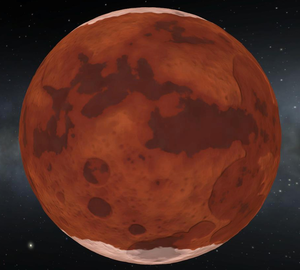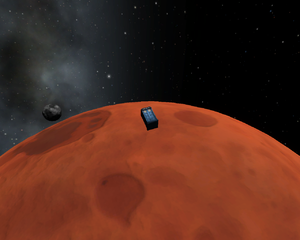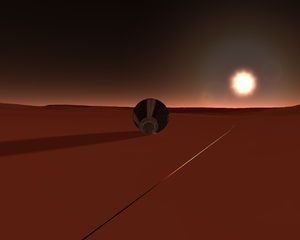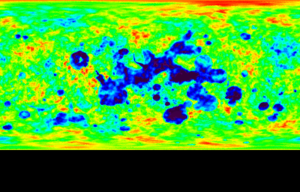Difference between revisions of "Duna"
(→Atmosphere) |
|||
| Line 25: | Line 25: | ||
* [http://en.wikipedia.org/wiki/Solar_day Solar Day]: 18 hours, 3 minutes, 11 seconds. | * [http://en.wikipedia.org/wiki/Solar_day Solar Day]: 18 hours, 3 minutes, 11 seconds. | ||
| − | *[http://en.wikipedia.org/wiki/Geosynchronous_orbit Synchronous Orbit] altitude: | + | *[http://en.wikipedia.org/wiki/Geosynchronous_orbit Synchronous Orbit] altitude: 2865,5 km; [http://en.wikipedia.org/wiki/Geostationary_orbit Stationary Orbit] velocity: ... m/s |
== Orbital Characteristics == | == Orbital Characteristics == | ||
| Line 61: | Line 61: | ||
* [[Moon]] | * [[Moon]] | ||
* [[Asteroid]] | * [[Asteroid]] | ||
| + | |||
| + | |||
| + | == Refrence == | ||
| + | I did the stationary calculation on [http://www.ajdesigner.com/phpgravity/keplers_law_equation_period.php this site], imputing the mass of the planet, and trial and error on the orbital radi. It is untested, so it might be wrong. (3185,5 km orbit gave the same ammount of seconds the plant day is, minus the radi' of the planet). It seems that the dunasync orbit is exactly the same as kerbins :) | ||
| + | |||
{{Celestial Bodies}} | {{Celestial Bodies}} | ||
[[Category:Celestials]] | [[Category:Celestials]] | ||
Revision as of 09:00, 22 September 2012
Duna is the fourth planet of the Kerbolar star system. It is the Mars analog for Kerbal Space Program and is mostly red with polar icecaps.
Contents
Characteristics
- Equatorial Radius: 320km
- Mass: 4.5149569e21kg
- Density: 32.893877139e12 kg/km^3
- Volume: 137.258277e^15m^3
- Surface Gravity: ~2.94m/s²
- Gravitational parameter: 301.321km³/s²
- Escape velocity from surface: 1372.3m/s
- Sidereal Rotation Period: ... hours; Rotation: ... degrees per hour, or ... m/s at the equator
- Solar Day: 18 hours, 3 minutes, 11 seconds.
- Synchronous Orbit altitude: 2865,5 km; Stationary Orbit velocity: ... m/s
Orbital Characteristics
- Semi-Major Axis: 20,726,194.5km or ... Astronomical Units (A.U.)
- Velocity: ~7530.65 m/s (average determined by velocity at Apobol and velocity at Peribol.)
- Argument of Periapsis: ...°
- Mean Anomaly at Epoch UT = ...
- Orbital Period: 4,809.6 hours, or 200.4 Earth days
- Sphere of influence: 47,921 km
Topography
Duna is a iron-rich planet which has greatly varying land altitude, the consequence of which is very difficult judgment of a safe landing position. Its mountainous ranges are a peril to landing craft, especially considering the thin atmosphere, where very little aerobraking can be done safely. It is important to slow one's ship down before coming into the atmosphere, to ensure a safe decent. Its two poles are very expansive and are the result of a thin atmosphere.
Atmosphere
Duna's atmosphere begins at approximately 41km. Parachutes work with a slightly lower efficiency, making powered descent a required step of landing on the surface from orbit (unless your craft is just a pod with a parachute).
Natural Satellites
Duna's only natural satellite is the moon Ike.
See Also
Refrence
I did the stationary calculation on this site, imputing the mass of the planet, and trial and error on the orbital radi. It is untested, so it might be wrong. (3185,5 km orbit gave the same ammount of seconds the plant day is, minus the radi' of the planet). It seems that the dunasync orbit is exactly the same as kerbins :)



